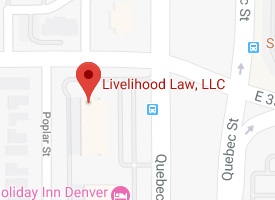
If you are one of the nearly 40 million Americans with a disability, you may be concerned that disability discrimination will keep you from pursuing or advancing in your chosen career. Fortunately, there are federal and state laws in place to ensure that individuals with disabilities have the same rights to a successful career as every other citizen.
The Americans With Disabilities Act (ADA) and the Colorado Anti-Discrimination Act (CADA) prohibit discrimination against employees because of a real or perceived disability. These rules are designed to make sure that individuals with disabilities are treated fairly throughout the employment process.
If you are a person with a disability or you have a loved one in this situation, it’s important to know your rights at work. So let’s discuss some of the basics about protecting yourself against disability discrimination in the workplace.
How Do I Know If I Have A Disability Under The Law?
The ADA and CADA defines disabilities as a physical or mental impairment that substantially limits one or more major life activities. These major life activities include:
- caring for yourself;
- walking, sitting, standing or lifting;
- seeing, speaking or hearing;
- breathing,
- learning, thinking or concentrating; and
- interacting with others.
If you have a disability you are protected under CADA and/or the ADA.
What is Disability Discrimination?
Disability discrimination occurs when an employer treats a disabled job applicant or employee less favorably because of a real or perceived disability. This unfavorable treatment may occur at any stage of the employment relationship including hiring, firing, promotions, training, job assignments, accommodations, pay and benefits. Employers may also be liable for disability discrimination if they ask prohibited health-related questions during an interview, refuse an employee’s request for a reasonable accommodation or employees face harassment because of their disability.
What Is A Reasonable Accommodation?
A reasonable accommodation is any change in the work environment or business practices designed to help a person with a disability apply for a job, perform the duties of a position or enjoy the benefits and privilege of employment. Some common forms of accommodation include making the workplace wheelchair accessible or providing assistance to someone who is blind or hearing impaired.
Employers do not have to provide the exact accommodation an employee or job applicant requests if more than one modification is available. Business owners also do not have to provide for accommodations that would be too difficult or expensive to implement. However, employers must provide accommodations that are reasonable in light of the circumstances.
A great resource to utilize is the Job Accommodation Network (JAN). They provide free consulting services for all employees, regardless of the condition. Their services include a consultation regarding job accommodations, including the accommodation process, accommodation ideas, product vendors, referral to other resources, and ADA compliance assistance. Their website also includes a form letter for requesting an accommodation and a guide to negotiating a reasonable accommodation under the ADA.
What Employers Are Covered?
Businesses that employ at least 15 workers must follow the provisions of the ADA regardless of whether they are public or private institutions. CADA applies to employers of any size.
What Can You Do To Protect Yourself?
If you believe that you may be the victim of disability discrimination, it’s essential that you act fast to protect your rights. Livelihood Law is here to help. Contact us today so that we can assist you in evaluating your situation.


